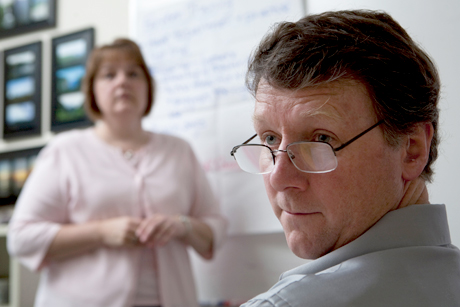Skills for Success updated to reflect work environment
By Nancy Doolittle

The work we do at Cornell affects more than our individual lives and the work of our department; it affects others across campus and beyond the university’s borders, and contributes to Cornell’s impact and success for years to come, say Cornell experts in organizational effectiveness.
This far-reaching impact underlies the newly released revisions to Cornell’s Skills for Success for faculty and staff, says Chris Halladay, associate vice president for organizational effectiveness in the Division of Human Resources and Safety Services. The revised Skills for Success are inclusive of the concept of sustainability, or of acting in ways that have a larger impact and inviting others to act in similar ways. “If every employee demonstrates the Skills for Success, together we will create an environment that makes Cornell the institution of choice,” he says.
The revisions also reflect the findings of the 2011 Employee Survey. “Staff indicated that they thought that the distribution of workload and the application of policies were inconsistent across departments, and that high-performing employees tended to get rewarded by receiving more work than low-performers,” Halladay said. “We need to better manage performance, and part of that is in providing clear career paths for those who want to advance. By adding the category of job skills, we could emphasize goal-setting and career development, and spell out the need to stay current in your job skills to reflect the changing workplace,” he said.
The Skills for Success debuted in 1997 and are used to assess the annual performance of faculty and staff and to guide employees in their professional development.
“We have been collecting feedback from individuals for about 10 years regarding what they believed needed to be updated,” says Kathryn Burkgren, director of organizational development for faculty and staff. “We have updated the language to include that feedback and the behaviors, actions and expectations that each member of the Cornell community should demonstrate,” she said. For instance, the “motivation” category has been renamed “innovation,” to reflect Cornell’s commitment to deliver “forward-thinking, tangible results,” Burkgren says.
Other skills are inclusiveness, adaptability, self-development, communication, teamwork, service-minded and stewardship.
Burkgren anticipates the launching of a new performance management process, tied to the revised skills, in 2014. “Colleges and units can choose to use the new performance management process and revised skills in the upcoming performance dialogues, or wait until FY15, to give individuals time to acclimate themselves to the changes,” she says.
In addition to Skills for Success, employees can reference a grid that matches skills to professional development training at Cornell, and can take free, online classes that support development of each skill through SkillSoft.
Media Contact
Get Cornell news delivered right to your inbox.
Subscribe